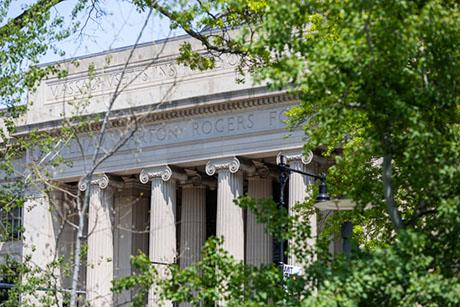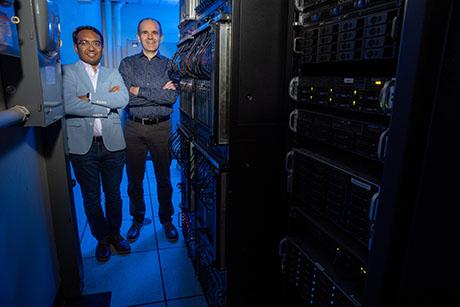MIT’s Buehler and Reis Elected to Society of Engineering Science Board of Directors
The Society of Engineering Science (SES) announced on Dec. 7 that Pedro Reis, the Gilbert W. Winslow Associate Professor of Civil and Environmental Engineering and Mechanical Engineering, and Markus Buehler, head of the Department of Civil and Environmental Engineering (CEE) and the McAfee Professor of Engineering, will join the SES as two of its four new Board of Directors’ members, effective January 2016. SES President Pradeep Sharma, of the School of Mechanical Engineering at the University of Houston, announced the election results.
“It’s an honor to be elected to this leadership role at SES by the distinguished members of the society,” Buehler said. “Especially now as the world’s challenges are becoming ever more increasingly complex, requiring bigger, broader solutions that span across traditional disciplines. Achieving large-scale impact on people and sustainability is a goal we share.”
The organization’s membership boasts leading engineers, scientists, and mathematicians from around the world who focus on opportunities at the interface between these fields. Founded in 1963, SES’s mission is to promote the free exchange of information on all aspects of engineering science and to provide a forum for discussion, education, and recognition of the talents of the engineering science community. The society hosts an annual technical meeting and presents several distinguished awards.
Buehler is now in his third year as head of CEE, has been a member of MIT’s faculty since 2006, and has been involved with SES for more than a decade. With a multidisciplinary engineering and science background, his teaching and research interests center on the mechanics of materials, molecular mechanics and multi-scale modeling and simulation. He has made contributions in understanding deformation and fracture processes, the translation from biological materials to bio-inspired synthetic materials, and the integration of experiment and modeling. His most recent book, “Biomateriomics,” presents a new paradigm for the analysis of bio-inspired materials and structures to devise sustainable technologies, and further connects insights from contrasting fields such as materials and structures to music and language.
Buehler’s passion is to develop a solid foundation for the future of engineering science, and to engage stakeholders in its success, at a global level. He sees great potential in convening engineers, scientists, and mathematicians from around the world in the discussion of how engineering science can solve grand societal challenges, such as energy and environment, medicine, and engineering design. He plans to increase the involvement of students in SES and foster new generations of membership.
Reis has been a member of the SES for five years. His work focuses in the mechanics of solids and structures, with a particular emphasis on the mechanical instabilities of slender structures such as rods, plates, and shells. Despite the common understanding that instabilities such as buckling often pave the way to failure, Reis uses mechanical instabilities as a way to exploit new functionalities over a wide range of length scales. For example, Reis and his group have recently developed a new class of smart curved surfaces whose topography can be changed on demand for tunable aerodynamic drag reduction.
"The SES has carved an important niche for collaboration in curiosity-driven research and innovation-fueled applications,” Reis says. “I am eager to support this vision of science-enabled engineering and engineering-motivated science."
As a member of the Board of Directors, Reis will leverage his own background to support the SES mission. There is a need, he says, to sustain a successful annual technical meeting, as the popularity has skyrocketed in recent years. The members are the pillars behind vibrant, encompassing, and stimulating symposia and the Board of Directors should be a catalyst in these efforts. Moreover, there is a need to better engage the younger generations, especially students, postdocs, and junior faculty, by establishing awards to recognize their achievements and special sessions to enhance their professional connectivity.
Reis received both his PhD and BS in physics from the University of Manchester and joined the faculty of the School of Engineering at MIT in 2010. In 2013, Popular Science included Reis in its Brilliant 10 list of young stars in science and technology.
Other members elected to the SES Board of Directors include Vicky Nguyen '98 of Johns Hopkins University and Glaucio Paulino of the Georgia Tech.


